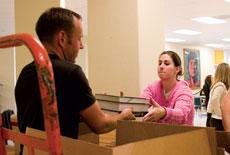Students gather to send books overseas

John Helme, junior international business major, hands a stack of books to Shawna Casey, senior business management major April 12.
Students in Missouri Southern’s Robert W. Plaster School of Business Administration are sending textbooks to students across the world with Books for Africa and the Global Text projects.
During the past few weeks, students in Dr. Nanette Philibert’s Organizational Behavior class gathered, sorted and packaged 266 cubic feet of books to send to Africa.
“For the first time we’ve ever done this I think it’s been pretty good,” Philibert said.
The project was born out of a challenge and the desire to teach social responsibility to business students.
“Our goal was to send college-level textbooks to the program but it kind of got expanded,” Philibert said.
Students collected items from across campus, National Geographic magazines, children’s books from the English department and many textbooks donated by the bookstore.
Vedita DeFreitas, senior management major, helped establish a timeline for the project. She is pleased with the idea that one of her class projects will help young people who are less fortunate.
“I’d love to do it again,” DeFreitas said. “It was a lot of books and I was just surprised we got them all packed in two days.”
Global Text is another project, compiling text for an online marketing and management textbook. The project eliminates shipping costs and any copyright issues.
“It is cheaper to get a copy machine than to have to go buy a textbook,” Philibert said. “This way we are giving them the open-source so they can download and then print them.”
Students contributing to the project must sign away their rights to the material they create, Philibert said being listed as a textbook contributor is a great way to preserve student work for a professional portfolio.
“Instead of just tossing that paper in the trash,” Philibert said, “their work is actually turned into a textbook. A lot of people build facilities, but to get the materials is difficult.”
Your donation will support the student journalists of Missouri Southern State University. Your contribution will allow us to purchase equipment and cover our annual website hosting costs.



























